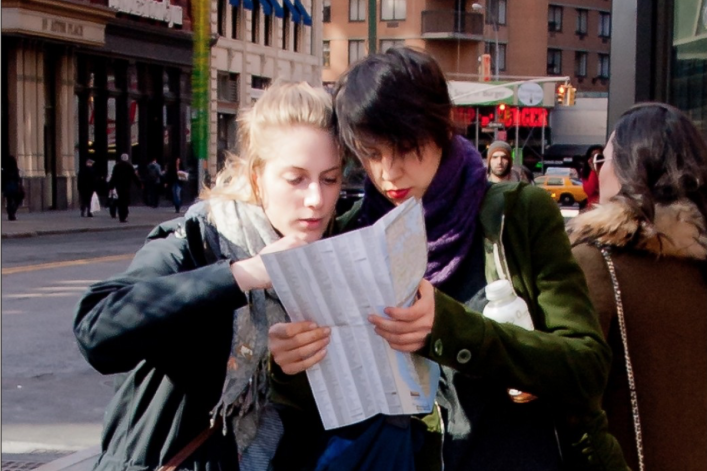Relocating to New York City—or know someone who is? FAQs brokers can (and can't) answer

Welcome to New York. First things first: Learn how to say, "Houston Street."
iStock
Remember back when you pronounced "Houston" Street like that city in Texas, assumed all New York City apartments came with closets, microwaves, and dishwashers, and that co-ops were homes for chickens? Maybe you still do.
Whether you are a new or old hand at NYC real estate, chances are you will find this collection of most frequently asked questions—provided by brokers who work with first-timers—educational, entertaining or both.
1. "When should I start looking? How long will it take?"
"Out-of town renters are shocked at the speed with which deals are made here. Especially in a hot rental market like the one we’re in now," says agent Leslie Hirsch of Engel & Volkers New York Real Estate. Remember that you should go to any showing with all your documentation and be prepared to sign a lease. It can happen that fast.
Potential renters are also surprised to hear when they should start looking for a rental, agrees Citi Habitats' president Gary Malin.
”It’s 30 days before the desired move-in date," says Malin. "They think that’s a very tight window, but that’s how it works here.”
Generally speaking, by the way, there's more inventory at the beginning of the month than at the end, though some landlords may make an apartment available mid-month.
2. "Is that it?"
Space is an issue for many newcomers. Lots of agents have shown studios to renters from out-of-state, only to have them ask, ‘Ok, where is the apartment?’ while they are standing in the middle of the living area. Hirsch calls this the “Welcome to New York moment.”
“It’s a broker’s job to manage the client’s shock at the small room sizes and lack of closets," she says.
3. "Are you serious about that price?"
"For some, the price tag can be a pleasant or unpleasant surprise," says Hirsch. "A buyer from Florida may be shocked at what you get for your money here, but on the other hand a buyer from Hong Kong or London will view NYC apartments as good value."
One agent recalls a Florida renter seeking a “spacious studio in the West Village with a pool on the roof for $1,700.” He added that he didn’t mind if it had to be a walk up. (Despite that willingness to be flexible, you’re never going to find a studio in the West Village for that rent, pool or no pool.)
4. “How much will I actually pay each month?”
It’s not always as straightforward as one might expect. Lots of New York City landlords offer a “free month” at the beginning or end of a lease to encourage you to sign a lease. Some landlords spread the discount over the term of the lease in what's called the net effective rent or the advertised rent, but the amount that you actually pay—known as your gross rent—during your non-free months is going to be much higher.
You can dispel any mystery about your monthly nut using Brick Underground's Gross Rent Calculator, which enables you to easily calculate your gross rent, make quick apples-to-apples comparisons between apartments and avoid expensive surprises. All you'll need to figure out your gross rent is 1) the net effective rent, 2) the length of your lease, and 3) how many free months your landlord is offering.

Brick Underground's
Gross Rent Calculator
What's this?
Some New York City landlords offer a free month (or more) at the beginning or end of a lease. The advertised rent is the net effective rent. The net effective rent is less than the amount you will actually have to pay --- known as your gross rent --- during your non-free months.
Brick Underground's Gross Rent Calculator enables you to easily calculate your gross rent, make quick apples-to-apples comparisons between apartments and avoid expensive surprises. All you'll need to figure out your gross rent is 1) the net effective rent, 2) the length of your lease, and 3) how many free months your landlord is offering. [Hint: Bookmark this page for easy reference!]
To learn more about net effective versus gross rents, read What does 'net effective rent' mean?.
If the landlord is offering partial months free, enter it with a decimal point. For example, 6 weeks free rent should be entered as 1.5 months.
5. "Why do rental brokers charge fees here?"
This is perhaps one of the most painful aspects of renting here. A broker’s fee—12 to 15 percent of the annual rent—is a hefty chunk of money, however, for many people, it’s worth it. That’s because a good broker can mean the difference between signing a lease on the apartment you want in a short timeframe and pounding the pavement for weeks seeking an apartment on your own. Here, brokers make the case for their services.
But another school of thought argues that if you have the time, it’s not necessary to use a broker—or pay such a high fee.
"New York is such a competitive market that the landlords don't need to incentivize brokers to bring their clients to the apartment complexes," explains Phil Lang, who along with fellow Yale graduate David Walker, co-founded the upstart, tech-savvy brokerage Triplemint six years ago in response to the frustrating apartment-hunting experiences of their classmates and colleagues.
(Note: While broker's fees in New York typically range from 12 to 15 percent of a year's rent, BrickUndergrounders who sign up here can take advantage of the corporate rate—usually around 10 percent—offered by Triplemint, a Brick Underground partner.)
You should also know that sometimes landlords are willing to cover or the broker’s fee.
"In the winter months or in a newer building with higher vacancies, we tend to see landlords willing to cover broker fees as a way to incentivize tenants to rent the units," says Lang.
6. "How much do I have to earn to rent a place? Can roommates combine incomes?"
Most landlords do allow roommates to combine incomes, says Lang. Whether applying with roommates or all by yourself, the total annual haul must equal around 40-45 times the monthly rent.
And even renters who meet the income test will still have trouble finding a place without a credit history.
"One option is to find a landlord who will accept a larger security deposit, usually around four to six months rent," says Lang, who notes that this is not an option in rent-stabilized buildings, which include "some of the newer super-luxury buildings in the city" built under a tax abatement program.
Another option for curing a lack of credit and/or income is to line up a guarantor—someone who lives in the tri-state area who earns 80-100 times the monthly rent and promises to pay any balance owed if you default on your lease.
If that's not possible, you may be able to use a service like Insurent, which will step in as your guarantor for a bit less than a month's rent if you have U.S. credit and a bit more if you're a foreign national with no U.S. credit. (Note: Most landlords will accept only one guarantor per lease, so if you're applying with roommates and can't find a friend or relative willing to guarantee the entire lease, Insurent is a useful option. In that scenario, all of you are on the hook for the rent, and if one person fails to pay, not only could you get evicted, it could impact your credit score.)
7. "What does Fidi mean?"
Hirsch has been (repeatedly) asked, “What’s with the funny neighborhood names—Soho, Noho, Fidi?”
FYI, newbies, Soho is a trendy neighborhood that stands for South of Houston Street, NoHo stands for the equally trendy area North of Houston, and Fidi is a nickname for the Financial District. Also, be forewarned that brokers will often come up with these nicknames to make a neighborhood seem more trendy, SoHa (South Harlem) anyone? DoBro? (Downtown Brooklyn)
8. "What is a "true 2" vs a flex 2? A junior 4? Junior 1?"
A Junior 1 is a studio with a sleeping alcove. A Junior 4 is a one-bedroom plus a dining area that can be converted into a makeshift bedroom with a temporary and potentially illegal wall. A 'true' two-bedroom has two distinct separate bedrooms that require no temporary wall alchemy.
9. "Why would I want a doorman?"
"People who've never lived with a doorman don't understand why other people want one," says Lang. "I explain that a doorman can receive packages, hold an extra set of your keys and also provide a sense of security because they screen every person who comes in and out of the building. Doormen often become like another member of the family.” Here’s one story of adjusting to life in a doorman building.
10. "Is it better to rent or buy?"
Citi Habitats' Malin says he gets questions about whether it’s better to rent or buy in this market (a tough question that depends on a lot of things like how long you're planning on being here, how much money you have for a downpayment, etc.) as well as what the difference is between a co-op and a condo.
Quick answer to the latter question: In a condo, you're buying the apartment outright whereas in a co-op, you're buying shares of a co-operative. In most cases, for a condo, you'll pay extra for the luxury of not having to face a co-op board interview and not having to deal with as many restrictions as in a co-op. (For much, much more, check out Brick Underground's How to Buy a NYC Apartment guide.)
If you're looking to buy and not seeing enough places for sale in your price range or target neighborhood -- and/or you'd like to avoid a bidding war—consider expanding your search to "off-market" listings. NYC real estate brokerage Triplemint, a Brick Underground partner, uses technology to mine public records and identify owners who may be ready to sell, meaning you can meet and deal with owners before their homes hit the market.
11. "Does it have exposed brick?"
“That's the most common question I get," says Marco Maisto of Citi Habitats. (If the place you ultimately land in does, you’ll need this post about living with brick walls—and how to hang things on them.) If you really need help with basic DIY, consider taking a class.
With more and more Asian buyers, June Phillips of Halstead says that she gets a lot of questions about the feng shui of the property for sale.
“A sale recently fell through because the bathroom wasn’t in the right place," she says.
12. “Is the neighborhood safe?”
Daniele Kurzweil of Compass gets this one, and notes that this is subjective.
“What might be safe for some might not be safe enough for others,” she says. “Relocating means leaving what you know for the unknown...There are things you can do to keep yourself safe and the number one thing for people to remember is to always be aware of your surroundings.”
However, plugging an address into Localize.city can give you information on crime in the neighborhood.
13. “How far is this from ...?”
Kurzweil often has to do some NYC transit education, particularly for people used to driving to and from work.
“Access to public transportation is not at the forefront of people’s minds,” she says. “While you might be half a mile from work, if you are nowhere near a subway, that can be a very long walk in the winter. Sometimes living further away from your desired location can be a time saver since you are closer to many transportation options. Living a mile into Brooklyn where you are only serviced by the L train can take five times longer to commute than living four miles away in Upper Manhattan.”
You can also figure this out for yourself using Google Maps to plot the distance between home and office and see how long it will take you to get there by subway or other modes of transportation.
14. "Will I like it?"
Obviously, no one can tell you that for sure, but it is still a question that agents hear.
A relocation specialist who helped a client move from Atlanta to New York City says that her client’s biggest question was, “Will I like it?”
The client was taking a big leap: Renting out her house, selling two cars, and moving to NYC without a job lined up. Her biggest fear was whether living in New York would ruin it as her favorite city. (It didn't.)
15. "Is there room for my (very, very large) pet?"
Finding apartments that take pets—especially large dogs—is always challenging. Here’s what you can expect from a canine screening process. Got a pit bull? Tips on renting and living with one in NYC can be found here.
People have all kinds of animals and requests; Compass broker Scott Elyanow says he was once asked to find an apartment with accommodation for the client’s horse.
“He wanted to know if any buildings on the Upper West Side had a stable," says Elyanow. (Ultimately, Elynow directed him towards New Jersey.)
16. "How old/young/uncool are my neighbors?"
There are a number of questions that brokers are not allowed to answer that relate to some of the “trigger” words and phrases prohibited from real estate listings by the Fair Housing Act.
Examples include “Are there lots of empty-nesters in the building?” and “Are there lots of kids in building?”—questions which are out of bounds for reasons of age and/or family discrimination.
17. "How are the local schools?"
For the same reason as above, brokers also have to be careful about answers they give to questions about schools—they can say what schools are nearby but not much more. They can’t say how good they are or much else about them.
Thus, when it comes to school-related queries, renters and buyers must look elsewhere; BrickUnderground's guide to buying and renting in NYC is a good start, as is our buyer’s and renter’s guide to the NYC elementary school game.
You Might Also Like



























